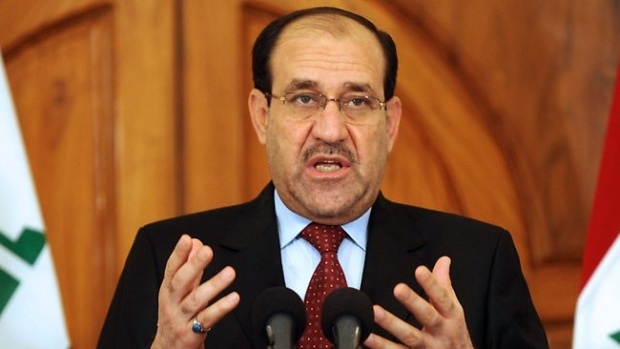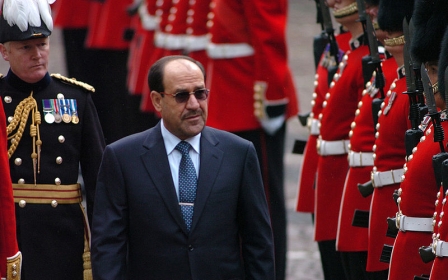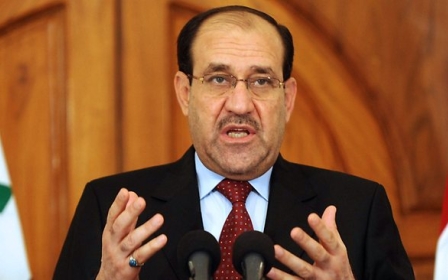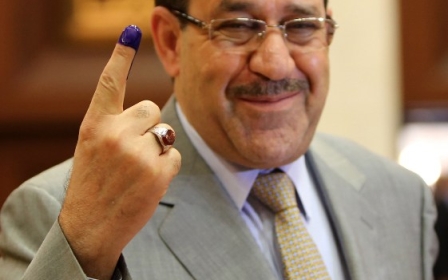Early Iraqi results due Monday, with Maliki still favourite

Election results due Monday are expected to put Nuri al-Maliki in the driver's seat to remain Iraq's prime minister for a third term despite vocal opposition and markedly worsening security.
The tallies from the April 30 general election, delayed for weeks due to a litany of complaints according to the electoral commission, are likely to show Maliki's bloc won the most seats in parliament but fell short of a majority.
That would mean the incumbent, who hails from Iraq's Shiite majority, would require the support of Sunni Arab and Kurdish parties.
But many of these have refused to countenance another term for Maliki, who they accuse of consolidating power and being to blame for a protracted surge in unrest.
Iraq's electoral commission is expected to release the results, which remain subject to challenge, soon.
New MEE newsletter: Jerusalem Dispatch
Sign up to get the latest insights and analysis on Israel-Palestine, alongside Turkey Unpacked and other MEE newsletters
Leaked reports released by political parties and reported by Iraqi media throughout the vote counting process have said Maliki's State of Law alliance would win around 90 out of 328 seats in parliament.
A handful of smaller parties -- including those linked to former premier Iyad Allawi, powerful Shiite cleric Moqtada al-Sadr, and Kurdish regional president Massud Barzani -- are estimated to each win between around 20 and 30 seats.
Regardless of the final results, the government formation process is expected to take months as the various parties are likely to seek an all-encompassing government package, including the selection of the president and the speaker of parliament.
Under a de facto agreement between Iraq's communities, the prime minister is a Shiite Arab, the president a Kurd and the parliament speaker a Sunni Arab.
The election and its aftermath come amid a year-long surge in violence that has left more than 3,500 people dead this year, fuelling fears Iraq could be slipping back into the all-out conflict that left tens of thousands dead in 2006 and 2007.
The run-up to the vote, Iraq's first since US troops withdrew at the end of 2011, was plagued by attacks on candidates and campaign rallies, and allegations of malpractice that contributed to lower turnout in areas of the country populated by disgruntled minority Sunnis.
But it has nevertheless been hailed largely as a success by the international community, with the US and UN praising Iraqi voters for standing up to militancy.
Top Kurdish MP demands Iraq confederation
A top Iraqi Kurdish lawmaker has urged the newly elected parliament to change the constitution to pave the way for the creation of an Iraq confederation.
"The House of Representatives needs to amend the constitution to allow a confederation because it is the ideal solution for Iraq's problems," Deputy Parliament Speaker Aref Tayfour said in a statement on Sunday.
"This [demand] is the right of the Kurdish people who have suffered for decades under successive totalitarian regimes," he added.
Kurds are Iraq's second largest ethnic group after Arabs, with a population of around 5.2 million, according to the latest estimates by the autonomous Kurdish administration in Northern Iraq.
Relations between Baghdad and the Kurdish administration have been strained for years.
Bones of contentions include the annual state budget, oil exports and relations with the central government in Baghdad.
The Kurdish region of northern Iraq is believed to have one of the largest untapped oil reserves in the world, with more than 45 billion barrels of oil according to some estimates.
In November 2013, the Kurdish administration signed an agreement that would enable Kurdish oil to flow to Turkey's port of Ceyhan.
Baghdad opposed the agreement on the ground of bypassing the country’s national oil company, State Oil Marketing Company, and violating Iraq’s constitution.
"There is a pressing need for a tangible political change," Tayfour said. "The new parliament must recognize the reality on the ground."
Iraq election candidate kidnapped
In the northern Baghdad neighbourhood of Jamila, gunmen opened fire on Rahman Abdulzahra al-Jazairi early on Sunday morning while he was near his home, wounding his father and brother, police said.
The militants then snatched Jazairi, the general secretary of Hezbollah Warithun, an offshoot of the main Hezbollah party in Iraq.
Jazairi's party is not expected to win any seats in parliament following the April 30 vote, the results of which are due to be released later Sunday or on Monday, election commission officials say.
It was not immediately clear who was behind the kidnapping, but Jazairi's party said on Facebook that security camera footage had helped identify the militants behind the incident and said security forces were working to release him.
The abduction is the first incident of its kind since the election, the run-up to which was plagued by attacks on campaign rallies and candidates, but no reported kidnappings.
Middle East Eye delivers independent and unrivalled coverage and analysis of the Middle East, North Africa and beyond. To learn more about republishing this content and the associated fees, please fill out this form. More about MEE can be found here.




